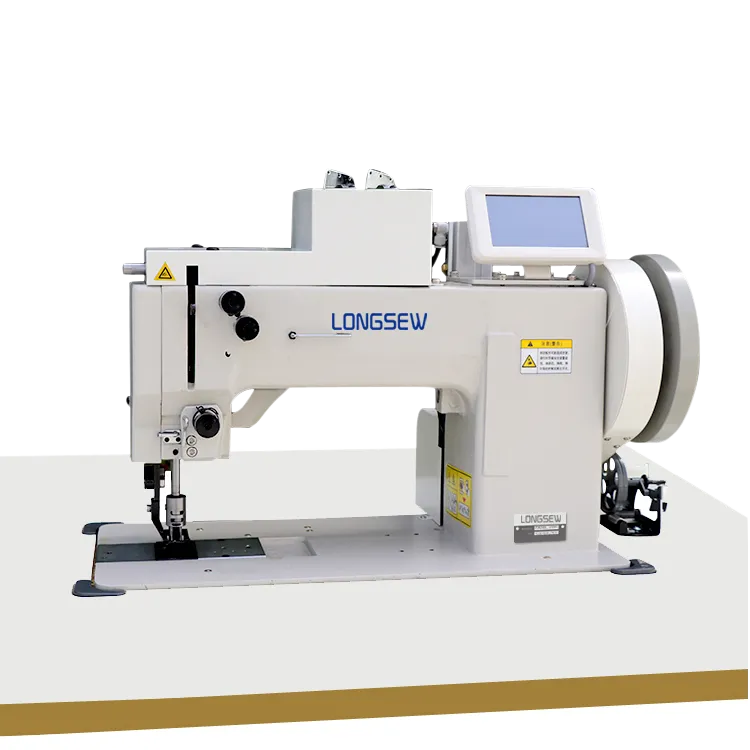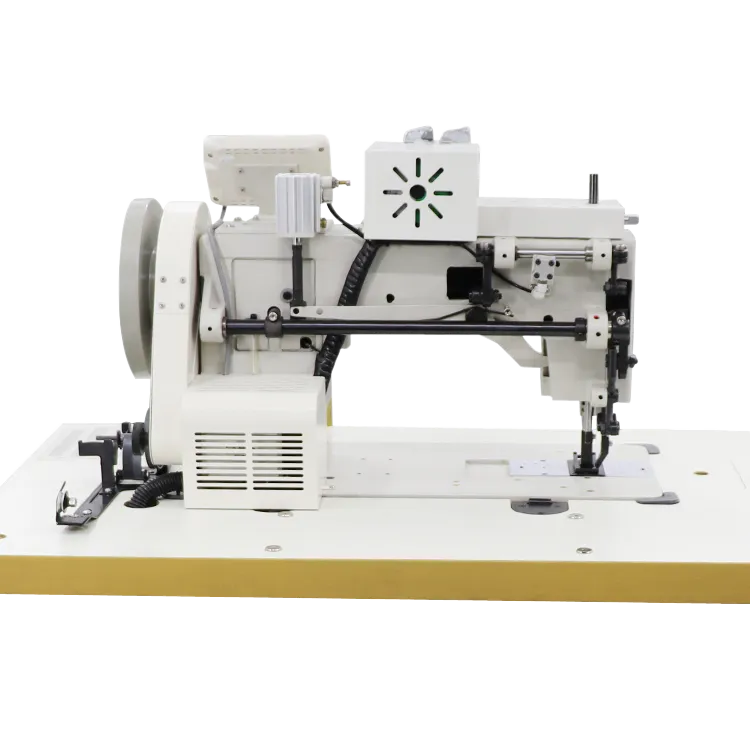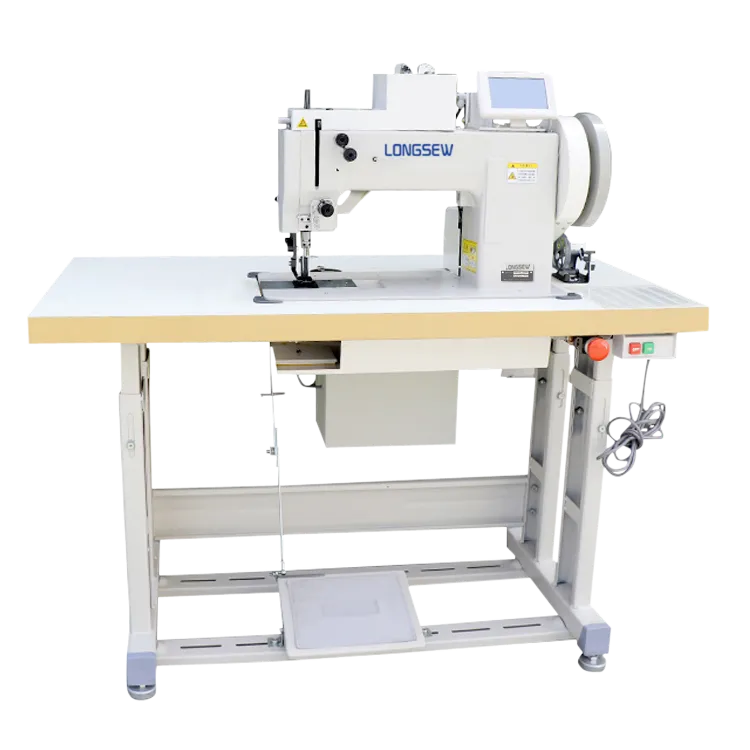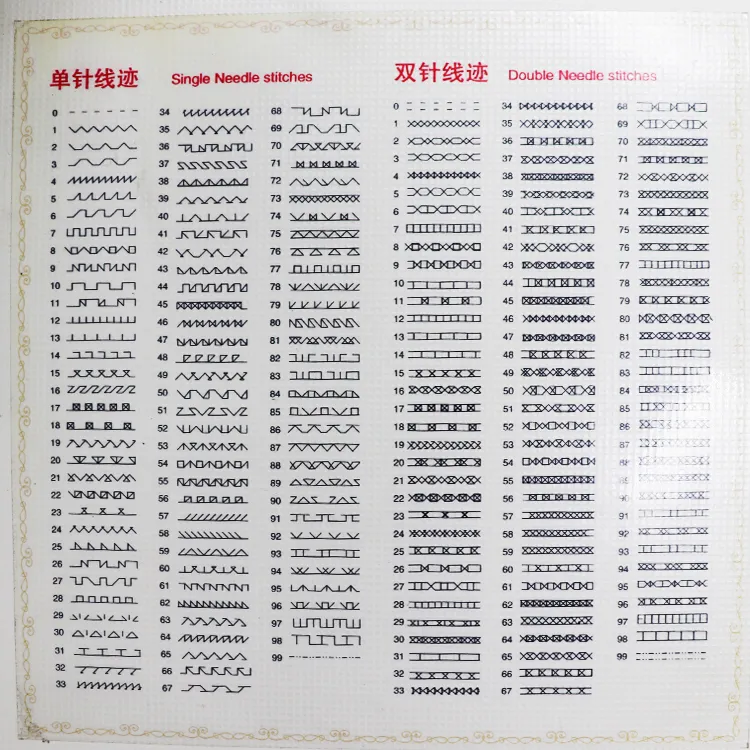Heavy Duty Industrial Sewing Machine: Auto, CNC Pattern & Precision
Navigating the Landscape of Heavy Duty Industrial Sewing Machines
The global demand for high-performance textile and material joining solutions has propelled the heavy duty industrial sewing machine market into an era of innovation. These sophisticated machines are engineered to tackle challenging materials such as heavy leathers, industrial fabrics, composites, and technical textiles, which are beyond the capabilities of conventional sewing equipment. As industries evolve, the need for robust, reliable, and precise sewing solutions grows exponentially, driving advancements in automation, durability, and operational efficiency.
Industry trends highlight a significant shift towards computerized pattern sewing machine technology, offering unparalleled precision and repeatability. Manufacturers are increasingly integrating features like automatic thread trimming, programmable stitch patterns, and real-time monitoring to optimize production workflows. The market for heavy duty industrial sewing machines for sale is robust, with a particular emphasis on solutions that offer enhanced material handling, greater stitch consistency, and reduced downtime. This article delves into the intricate world of these essential industrial tools, covering their manufacturing, technical specifications, applications, and the competitive landscape.
Manufacturing Process Flow of Heavy Duty Industrial Sewing Machines
The production of a heavy duty industrial sewing machine is a complex, multi-stage process demanding precision engineering and stringent quality control. It involves the integration of high-grade materials and advanced manufacturing techniques to ensure durability, performance, and a long service life.
Key Stages in Manufacturing:
- Material Selection: High-strength alloys (e.g., cast iron, aluminum alloys for structural components; hardened tool steel for gears, shafts, and needle bars) are selected for their wear resistance, tensile strength, and fatigue life. Electronic components for auto heavy duty sewing machine and computerized models are sourced from reputable suppliers, ensuring reliability and long-term performance.
-
Casting and Forging:
- Casting: Main machine frames and bases are often cast from high-grade gray or ductile iron. This process provides excellent vibration damping, crucial for precise stitching at high speeds.
- Forging: Critical stress-bearing components like connecting rods, cranks, and gear blanks are forged. Forging aligns the grain structure, enhancing strength and resistance to impact and fatigue, which is vital for a heavy duty sewing machine operating under continuous load.
- CNC Machining: Precision machining is paramount. Multi-axis CNC (Computer Numerical Control) machines are employed to mill, drill, and turn components to extremely tight tolerances (e.g., ±0.005 mm). This ensures perfect alignment and smooth operation of mechanical parts, especially critical for high-speed and cnc pattern sewing machine applications.
- Heat Treatment: Components like gears, cams, and needle bars undergo various heat treatments (e.g., carburizing, nitriding, induction hardening) to achieve optimal surface hardness, wear resistance, and core toughness. This extends the service life significantly.
- Surface Finishing: Parts receive finishes such as chrome plating, black oxide, or powder coating for corrosion resistance, reduced friction, and aesthetic appeal, particularly important in demanding environments like petrochemical or marine applications.
- Assembly: Skilled technicians meticulously assemble thousands of components. This stage includes fine-tuning mechanical linkages, calibrating tension systems, and integrating electronic controls for features like automatic lubrication and programmable patterns.
-
Testing and Quality Assurance: Every machine undergoes rigorous testing to comply with international standards such as ISO 9001 for quality management and ANSI standards for safety and performance.
- Endurance Testing: Machines operate continuously under load for extended periods to simulate real-world usage and verify a service life often exceeding 10-15 years with proper maintenance.
- Precision Testing: Stitch quality, uniformity, and accuracy of pattern execution (for computerized pattern sewing machine models) are meticulously checked.
- Noise and Vibration Analysis: Ensuring comfortable and safe operating conditions.
Target industries for these robust machines include petrochemical (protective gear, filtration fabrics), metallurgy (heat-resistant materials), and water supply & drainage (geotextiles, sealing components). In these scenarios, the advantages are clear: energy-saving motor technologies reduce operational costs by up to 30%, and specialized coatings provide superior corrosion resistance against harsh chemicals and moisture.
Technical Specifications and Parameters
A deep understanding of technical specifications is crucial for selecting the appropriate heavy duty industrial sewing machine. These parameters dictate the machine's capabilities, efficiency, and suitability for specific materials and applications. For instance, the LS266-CP model, a prominent computerized pattern sewing machine, exemplifies advanced features.
| Parameter | Value/Description |
|---|---|
| Model | LS266-CP (Heavy Duty Single/Double Needles Computerized Pattern Sewing Machine) |
| Max Sewing Speed | 2,500 - 3,000 RPM (stitches per minute) |
| Stitch Length | 0.1 - 12 mm (programmable) |
| Needle Bar Stroke | 41.2 mm |
| Needle Type | DPx17, Sizes #18 to #26 |
| Hook Type | Large Rotary Hook (double capacity) |
| Presser Foot Lift | Manual: 8 mm, Knee Lift: 16 mm |
| Working Area | X: 600 mm, Y: 400 mm (customizable for larger patterns) |
| Motor | Integrated Direct Drive Servo Motor (750W - 1500W) |
| Power Consumption | Energy-efficient, up to 30% reduction compared to clutch motors |
| Control System | Touch-screen LCD panel, USB port for pattern input |
| Features | Automatic thread trimming, reverse stitching, programmable patterns, automatic presser foot lift |
| Materials Handled | Leather, canvas, denim, webbing, PVC, multi-layer composites |
The integration of direct drive servo motors in these machines significantly enhances energy efficiency, reducing power consumption by an average of 30-40% compared to traditional clutch motors. This not only lowers operational costs but also contributes to a quieter and more precise operation, essential for complex sewing machine embroidery designs or intricate pattern sewing machine for sale models.
Technical Advantages and Innovations
Modern heavy duty industrial sewing machines offer a suite of technical advantages that set them apart from conventional equipment, addressing the rigorous demands of industrial production.
- Superior Material Penetration: Engineered with powerful motors and robust feeding mechanisms (e.g., compound feed, unison feed), these machines can effortlessly penetrate multiple layers of dense materials like webbing, ballistic nylon, and thick leather, ensuring consistent stitch formation without skipping or breakage.
- Automated Pattern Recognition and Execution: Advanced computerized pattern sewing machine systems utilize CAD/CAM integration for precise replication of complex patterns. This significantly reduces human error, increases throughput, and is indispensable for manufacturing products requiring intricate or repetitive stitching, such as automotive interiors or safety harnesses.
- Enhanced Durability and Longevity: Constructed from high-strength alloys and precision-machined components, these machines are built for continuous, heavy-duty operation. Features like automatic lubrication systems minimize wear and tear, extending the machine’s operational lifespan and reducing maintenance frequency.
- Energy Efficiency: The transition to direct-drive servo motors provides on-demand power, leading to significant energy savings (up to 70% during idle times and 30-40% overall compared to clutch motors). This aligns with sustainable manufacturing practices and reduces operational overhead.
- Operator Comfort and Safety: Modern designs incorporate ergonomic considerations, reduced noise levels, and advanced safety features, improving the working environment and reducing operator fatigue.
- Versatility: With interchangeable presser feet, specialized needles, and adjustable tension systems, a single heavy duty sewing machine can be adapted to a wide range of materials and sewing tasks, from intricate detailing to robust structural seams.
Application Scenarios and Case Studies
The versatility of the heavy duty industrial sewing machine allows it to serve a multitude of critical applications across various demanding industries. Its ability to process challenging materials with precision makes it indispensable.
Key Application Areas:
- Automotive Industry: Used for upholstery, airbags, seatbelts, and interior components. The precision of a cnc pattern sewing machine ensures safety-critical seams meet stringent industry standards (e.g., ISO/TS 16949). For example, stitching multi-layer automotive fabrics often requires a machine capable of handling varying thicknesses and densities with extreme accuracy, preventing material puckering or slippage.
- Aerospace and Defense: Manufacturing of parachutes, protective covers, tactical gear, and component enclosures from technical textiles like Kevlar and Cordura. The reliability of stitches is paramount for life-saving equipment.
- Outdoor and Sporting Goods: Production of tents, backpacks, sails, tarpaulins, and awnings. These applications demand weatherproof, strong seams to withstand harsh environmental conditions. Machines with large working areas are ideal for large panels.
- Footwear and Leather Goods: Stitching heavy leather for boots, saddles, belts, and luxury bags. The controlled penetration and consistent tension provided by a heavy duty sewing machine prevent damage to expensive materials.
- Filtration and Geotextiles: Assembling industrial filters, geomembranes, and agricultural fabrics. These materials are often dense, abrasive, and require high-strength, sealed seams to prevent leakage or material degradation.
Case Study: Manufacturing High-Performance Safety Harnesses
A leading manufacturer of industrial safety equipment faced challenges in producing safety harnesses from multiple layers of heavy-duty webbing. Manual stitching was slow, inconsistent, and often led to material distortion, failing critical tensile strength tests. By implementing the LS266-CP heavy duty industrial sewing machine, equipped with a programmable pattern system, the company achieved:
- 35% Increase in Production Speed: Automated pattern stitching reduced cycle times significantly.
- 99.8% Stitch Uniformity: Computerized control ensured identical, perfectly formed stitches, meeting EN 361 standards.
- Reduced Material Waste: Optimized stitching paths minimized errors and rework.
- Enhanced Product Integrity: Consistent, strong seams passed rigorous pull-tests with ease, leading to higher product reliability and market trust.

This case illustrates how investing in an advanced auto heavy duty sewing machine solution can transform manufacturing processes, delivering both efficiency and uncompromising quality.
Vendor Comparison: Selecting the Right Heavy Duty Industrial Sewing Machine
Choosing the right vendor for heavy duty industrial sewing machines for sale is a critical decision that impacts long-term operational efficiency and profitability. Key differentiators often include machine technology, build quality, after-sales support, and customization capabilities. Here's a comparative overview of typical offerings from leading manufacturers (represented generically for illustrative purposes):
| Feature | Vendor A (e.g., LongSew LS266-CP) | Vendor B (Competitor) | Vendor C (Specialty Brand) |
|---|---|---|---|
| Primary Focus | Computerized Pattern, High-Volume Heavy Duty | Standard Heavy Duty, High Speed | Ultra Heavy Duty, Niche Materials |
| Control System | Integrated Touch-screen CNC, USB | Basic PLC/Push-button | Custom PLC, Proprietary Interface |
| Working Area (X-Y) | Up to 600x400 mm (expandable) | Up to 250x160 mm | Varies widely, often compact |
| Max Material Thickness | 20-25 mm (depending on material) | 10-15 mm | Up to 30 mm |
| Energy Efficiency | High (Direct Drive Servo) | Moderate (Clutch Motor option) | Moderate to High |
| Customization | Extensive (work area, clamps, programming) | Limited (basic attachments) | Highly specialized, project-based |
| Certifications | ISO, CE, RoHS | CE | N/A (often custom, non-standard) |
When evaluating providers, look beyond the initial purchase price. Consider the total cost of ownership, including energy consumption, maintenance, spare parts availability, and the potential for customization to future-proof your investment. Vendors specializing in pattern sewing machine for sale with integrated CNC capabilities, like the LS266-CP, typically offer more advanced features and greater flexibility for complex manufacturing demands.
Customized Solutions for Specialized Needs
In the realm of industrial manufacturing, off-the-shelf solutions don't always suffice. Many enterprises require a heavy duty industrial sewing machine that is precisely tailored to their unique material, production volume, or design specifications. Reputable manufacturers offer extensive customization options to meet these specialized demands.

Areas of Customization:
- Working Area and Clamping Systems: For oversized projects (e.g., large tarpaulins, inflatable structures), the sewing field (X-Y dimensions) can be expanded. Custom pneumatic or electromagnetic clamping systems can be engineered to securely hold irregular or exceptionally thick materials, crucial for consistent stitch quality with a cnc pattern sewing machine.
- Needle and Thread Specifications: Adapting the machine for specialized needles (e.g., leather point, wedge point) or extremely thick threads (e.g., sizes #346, #415) to handle unique material characteristics or achieve specific aesthetic/structural requirements for sewing machine embroidery designs.
- Feeding Mechanism Modification: Adjustments to the feed dog and presser foot configurations to ensure optimal material handling for slippery, stretchy, or highly structured materials, preventing distortion. This includes specialized roller feeds or puller feeds.
- Software and Pattern Programming: Developing bespoke software interfaces for specific production workflows or integrating with existing CAD/ERP systems. Custom pattern libraries can be pre-loaded, accelerating production startup for complex components.
- Safety and Environmental Adaptations: Incorporating specialized guarding, ventilation systems, or material handling robotics for hazardous environments or to comply with unique regional safety regulations.
Customized solutions are particularly valuable for industries dealing with novel materials or highly specialized products, ensuring that the heavy duty sewing machine becomes an integral, optimized part of the manufacturing ecosystem.
Ensuring Trust and Authority: in Action
For B2B decision-makers, expertise, experience, authoritativeness, and trustworthiness () are paramount when considering a significant investment in a heavy duty industrial sewing machine. Our commitment to these principles is demonstrated through several key aspects.
Authoritativeness: Certifications and Partnerships
- ISO 9001:2015 Certified Manufacturing: All manufacturing processes adhere to the highest international standards for quality management, ensuring consistent product excellence.
- CE and RoHS Compliance: Our machines meet European safety, health, and environmental protection requirements, facilitating global market access.
- Strategic Partnerships: Collaborations with leading material science companies and automation integrators allow us to develop cutting-edge solutions for auto heavy duty sewing machine technologies.
- Years of Industry Leadership: With over two decades in the industrial sewing machinery sector, our accumulated expertise directly translates into superior product design and performance.
Experience: Customer Feedback and Service Cases

"Implementing the LS266-CP has been a game-changer for our composite material sewing line. The precision and consistent quality it delivers for our multi-layer products are unmatched. The machine has truly optimized our workflow and reduced material handling time significantly." – Production Manager, Advanced Composites Manufacturer.
Trustworthiness: Warranty and Support
We stand behind the quality of our heavy duty industrial sewing machine products with comprehensive support and warranties.
- Warranty Commitments: All new machines come with a standard 12-month warranty on mechanical and electrical components, extendable to 24 months for critical parts, underscoring our confidence in product reliability.
- Comprehensive After-Sales Support: Our global network of certified technicians provides installation, training, preventative maintenance, and rapid-response troubleshooting. 24/7 technical support is available via phone, email, and remote diagnostics for our computerized pattern sewing machine lines.
- Spare Parts Availability: A robust supply chain ensures quick availability of genuine spare parts, minimizing downtime and maximizing the operational lifespan of your investment.
Product Focus: Heavy Duty Single/Double Needles Computerized Pattern Sewing Machine LS266-CP
The LongSew LS266-CP represents the pinnacle of heavy duty industrial sewing machine technology, specifically designed for precision and versatility in challenging industrial applications. This model's capability for both single and double-needle operation, coupled with advanced computerized pattern functions, makes it an invaluable asset for manufacturers aiming for superior quality and efficiency.

Key Features and Benefits of LS266-CP:
- Configurable Single/Double Needle System: Offers the flexibility to switch between single-needle operations for intricate details and double-needle configurations for robust parallel seams on heavy materials, increasing productivity for items like safety harnesses or bag handles.
- Advanced Computerized Pattern Sewing: Features an intuitive touch-screen interface for easy programming and storage of complex stitch patterns. This is ideal for repetitive elements, decorative sewing machine embroidery designs, or functional reinforcements, ensuring perfect consistency across batches.
- Large Sewing Area (600mm x 400mm): Accommodates larger components and allows for multiple smaller patterns to be set up simultaneously, maximizing efficiency and minimizing material repositioning. This makes it a highly effective pattern sewing machine for sale for various industries.
- Integrated Direct-Drive Servo Motor: Provides powerful, precise, and energy-efficient operation. Its quiet functioning and immediate start/stop capabilities enhance operator comfort and production accuracy.
- Automatic Features: Equipped with automatic thread trimming, automatic reverse stitching, and automatic presser foot lift, which reduce manual intervention, improve stitch quality, and increase overall output.
- Robust Material Handling: The unison feed mechanism ensures smooth, uniform feeding of multiple material layers, preventing slippage and achieving perfectly matched top and bottom stitches, even on the most challenging materials.
The LS266-CP is not just a sewing machine; it's a comprehensive solution for manufacturers seeking to enhance precision, boost productivity, and maintain uncompromised quality in their heavy-duty sewing operations. It stands as a testament to advanced heavy duty sewing machine engineering.
Frequently Asked Questions (FAQ)
Q1: What types of materials can a heavy duty industrial sewing machine handle?
A1: These machines are specifically designed for robust materials, including heavy leather, canvas, denim, webbing, PVC, vinyl, multi-layer composites, Kevlar, Cordura, and other technical textiles. They excel where standard machines would struggle with penetration or material feeding.
Q2: What is the typical service life of a heavy duty industrial sewing machine?
A2: With proper maintenance and regular servicing, a high-quality heavy duty industrial sewing machine can have an operational service life exceeding 10-15 years, and often much longer for its core mechanical components.
Q3: How does a computerized pattern sewing machine improve efficiency?
A3: A computerized pattern sewing machine significantly boosts efficiency by automating complex and repetitive stitching tasks. It reduces manual labor, ensures perfect consistency, minimizes errors and rework, and allows for rapid pattern changes, leading to faster production cycles and higher output quality.
Q4: Are these machines energy-efficient?
A4: Modern heavy duty industrial sewing machines, especially those with direct-drive servo motors, are highly energy-efficient. They consume power only when actively sewing, leading to substantial energy savings (30-70%) compared to older models with clutch motors.
Q5: What is the lead time for ordering a customized machine?
A5: Standard heavy duty industrial sewing machines typically have a lead time of 4-6 weeks, depending on stock and configuration. For highly customized solutions, lead times can range from 8-16 weeks, contingent on the complexity of design, engineering, and component sourcing. Specific timelines are provided upon consultation and design finalization.
Conclusion
The landscape of industrial manufacturing is continuously reshaped by technological advancements, and the heavy duty industrial sewing machine stands as a testament to precision engineering, robust design, and innovative automation. From the meticulous process of material selection and CNC machining to the integration of advanced computerized controls, these machines are built to meet the most demanding production challenges across diverse sectors.
As industries increasingly rely on specialized materials and require flawless, repeatable stitching, the value of a high-performance auto heavy duty sewing machine becomes undeniable. With a focus on energy efficiency, operational longevity, and customizable solutions, manufacturers can achieve unparalleled productivity and quality. By carefully considering technical specifications, vendor reliability, and comprehensive after-sales support, businesses can make informed decisions that drive their operational success and maintain a competitive edge in the global marketplace.
References
- ISO. (2015). ISO 9001:2015 - Quality management systems – Requirements. International Organization for Standardization.
- ANSI/ASME. (Current Edition). Safety Standard for Sewing Machines. American National Standards Institute.
- Textile Institute. (2023). Advances in Technical Textiles and Industrial Sewing Technology. Journal of the Textile Institute.
- European Commission. (2011). Directive 2011/65/EU on the restriction of the use of certain hazardous substances in electrical and electronic equipment (RoHS). Official Journal of the European Union.
- Journal of Manufacturing Technology Management. (2022). "Automation and Precision in Heavy-Duty Material Fabrication." Emerald Publishing.
-
Boost Production Efficiency with a Pattern Sewing MachineNewsAug.29,2025
-
Industrial Excellence with the Best Heavy Duty Sewing MachineNewsAug.29,2025
-
Precision and Power with the Best Pattern Sewing MachineNewsAug.29,2025
-
Reliable Bulk Packaging Starts With the Right FIBC Sewing MachineNewsAug.29,2025
-
Advanced Packaging Solutions: Elevate Productivity with Jumbo Bag Sewing Machine and Industrial Stitching EquipmentNewsAug.29,2025
-
High-Performance Solutions for Bulk Packaging: FIBC Sewing Machine and MoreNewsAug.29,2025
-
Maximize Efficiency with an Industrial Cylinder Arm Sewing MachineNewsAug.28,2025


























